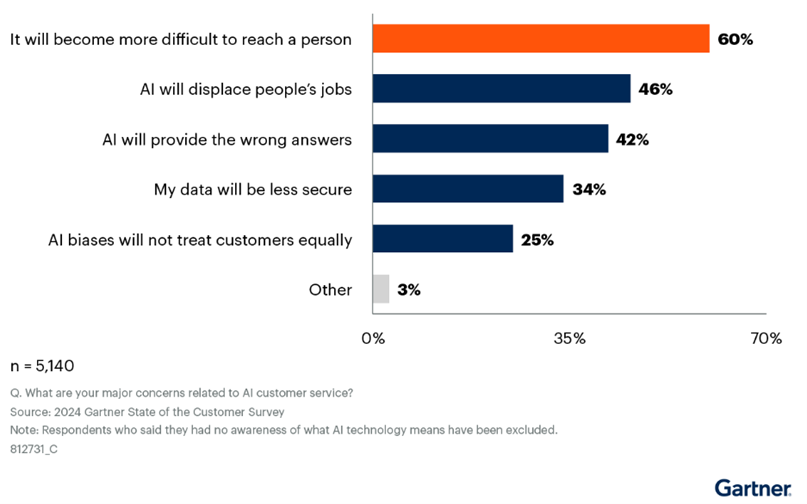
You may have noticed that some standard automated customer service systems have been replaced with more sophisticated AI assistants in the last couple of years. The more conversational interactions and other advances aren’t very popular, though, according to a new Gartner survey. In fact, 64% of customers would prefer companies not to implement AI in their customer service functions.
The survey, conducted in December 2023, involved 5,728 respondents. Companies flocking to AI platforms to replace or expand their customer service setups may be in for a rough reception, and those hoping it will solve customer service woes may actually be driving people away. A little over half, 53%, indicated that they would consider switching to a competitor if they discovered a company was using AI for customer service.
“Sixty percent of customer service and support leaders are under pressure to adopt AI in their function,” Gartner Customer Service & Support Research Senior Principal Keith McIntosh said in a statement. “But they can’t ignore concerns about AI use, especially when it could mean losing customers.”
Consumers worry that AI enhancements will only exacerbate the difficulty in reaching human agents, with 60% of respondents citing fear that AI will make it more difficult to reach a human agent as their top concern. The fear is that AI, while efficient in certain tasks, may fail to provide the personalized and empathetic responses that human agents offer.
“Once customers exhaust self-service options, they’re ready to reach out to a person,” McIntosh said. “Many customers fear that GenAI will simply become another obstacle between them and an agent. The onus is on service and support leaders to show customers that AI can streamline the service experience.”

Customer Disservice
As seen above, another significant concern is the potential for AI to displace human jobs. With 46% of respondents expressing anxiety over job losses, there is a clear fear that AI could replace human roles, leading to increased unemployment in the customer service sector.
Additionally, 42% of respondents are worried about AI providing incorrect information. This concern underscores the potential for AI systems to misunderstand or mishandle customer inquiries.
Beyond the immediate interaction concerns, 34% of respondents cited data security as a significant issue. Integrating AI into customer service involves handling vast amounts of personal data, raising fears about how securely this information is managed. According to Gartner, there are solutions, but they aren’t quick fixes.
“Customers must know the AI-infused journey will deliver better solutions and seamless guidance, including connecting them to a person when necessary,” said McIntosh. “For example, AI-infused chatbots must communicate to the customer that they will connect them to an agent in the event that the AI cannot provide a solution. It must then seamlessly transform into an agent chat that picks up where the chatbot left off. This way, the customer can trust that they will be able to efficiently find their solution while using the AI-infused channel.”
The allure of AI customer service for companies in terms of cost and potential better use of human employee time is obvious. The vision of happy customers for less money has driven a lot of development and deployment already. But, if Gartner's survey from seven months ago applies today and on a national or global level, these may be short-lived projects, and we'll all go back to immediately pressing 0 to get to a human agent to avoid automated menus.







